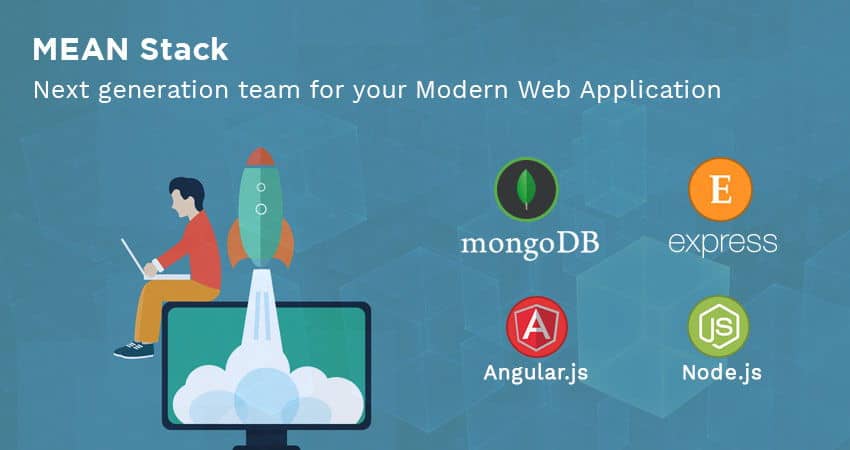An enterprise application is the one that requires making arrangements for accommodating multiple users. It needs to support large volumes of jobs and also has to ensure that work never stops. Besides, the enterprise application should offer the facility to store and process generated data. By taking cues from all these requirements, one can infer that an enterprise development has to be robust, fast, user-friendly and highly scalable as well as flexible. It should have a custom model of working to adjust to the needs of the businesses where these applications are installed.
MEAN stack development offers all these facilities to meet the objectives behind designing of enterprise applications.
What is MEAN Stack Development?
MangoDB is a NoSQL open source database and works on a document-oriented data model. Mostly, the companies are employing open source applications as these are built using the expertise of the best developers, it can be employed in a custom manner by tweaking in some changes, and a few of them come free of cost as well. Thus, the best tool at the best deal and developed from the cooperation of the finest experts give a quality whose match is hard to find. MEAN Stack development is a time-relevant process and allows easy upgrading of the work infrastructure without adding to the extra cost.
Best benefits of MEAN Stack development
As mentioned above, the MEAN stack is getting many takers because of the ease of coding and relevance in the application development. Some of the best benefits that it provides are:
1. Single Language Development
MEAN utilizes JavaScript language on both client-side and server-side developments. The use of single language throughout the system requires a cost-effective development resource as a single architect can take care of the whole project. Since the same language is employed on both the sides, there is more seamlessness in coordination and communication and eventually, the command processing becomes faster.
Supports isomorphic coding
Development need not bring the existing work or resource to halt. Since MEAN enables easy transfer of code from one framework to another, the enterprises do not refrain from trying and applying new technologies. The ease of isomorphic coding allows easy experimenting with upgradation tools or application of more coordinated networks creating better work infrastructure consequently. This is why; MEAN is now the trusted tool for many businesses relying mostly on applications or websites.
2. Cost-effective development
The use of a single language not only brings seamlessness of information transfer in both ends, there is a considerable reduction in the cost as well. While other development stacks like LAMP may need experts of MySQL, JavaScript and PHP on board, MEAN can become possible to achieve only with a JavaScript expert. Thus, less development cost and better deliverability allow the users to enjoy double whammy of performance and cost-effectiveness.
3. Supports High Speed and Reusability
An application can lose to its competitors if it is not appreciably fast. MEAN offers the applications the virtue of speed, which is a prime competition cutter in the present times. Further, blocking architecture of Node.js and the open-source nature of angular JS enabled by JavaScript bring in the reusability quotient in the use of framework. The MEAN development allows easy maintenance and testing without disrupting the normal working, thus, upgradation adoption becomes easier for the enterprises.
4. Enables cloud computing
The main benefit of cloud computing is again cost control. Cloud computing allows the users to carry out testing and upgradation plan implementation in a cloud, thereby, allowing the businesses to dispense with high cost devices. The cloud is available in a reusable manner, brings in the redundancy and allows making use of public libraries for the development process. Thus, there is no requirement of changes at in-house level. It brings down development cost considerably, and enables testing with no requirement of additional deployments.
5. Fully flexible development support
Cloud, open-source and completely redundant frame work and the virtues of personalized database management convenience provided in MangoDB brings in conspicuous flexibility advantage in the development process. The enterprise application development process meets no hindrances and the coders can exploit the code the way it helps in organizations’ processes. Cloud allows leveraging flexibility features to develop the applications that can work better without demanding too many resources in return. Thus, the advantage of flexibility offers ideal conditions for research and development and helps the organizations compete for better quality in product development.
Conclusion
MEAN stack is a whole support that the applications’ coding requires. The present times belong to the businesses that can mold the way the customers expect. The growing needs of digitization find the best match in MEAN stack development that can deliver fast, flexible and robust applications carrying added advantages of better adjustment capability and compliance.








